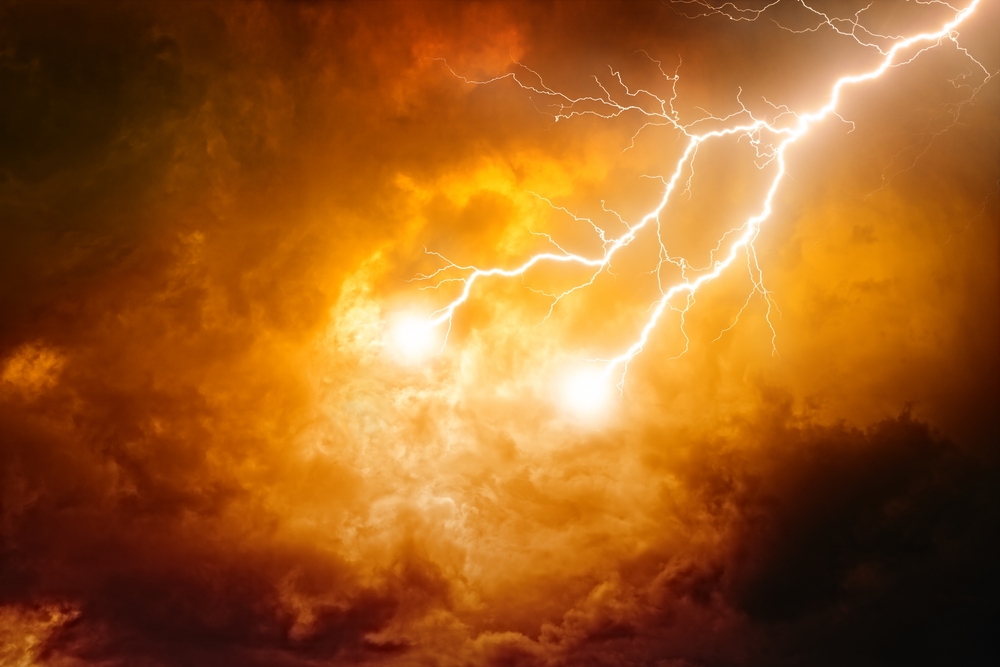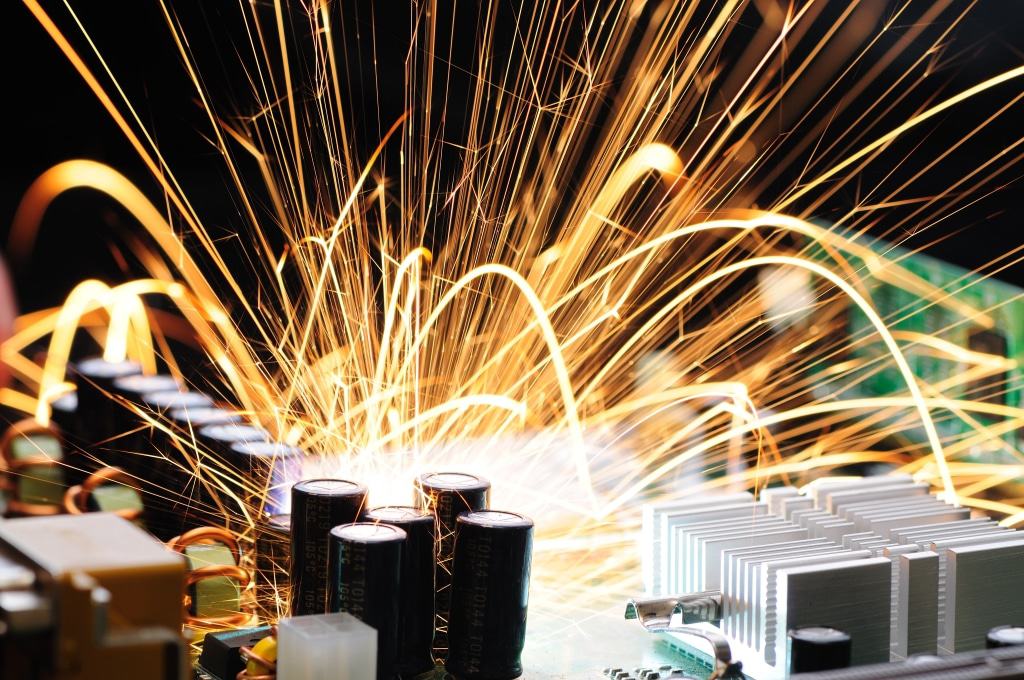
In states like Florida and California, a houseboat could be the perfect vacation home for beach lovers until lightning storms appear. Some houseboats owners are unaware of how to prevent and protect themselves during a lightning storm. So, are houseboats really safe during a lightning storm?
While the 1 in 1000 chances of lightning strikes on houseboats are slim, it is generally safer if you stay indoors, unload all electrical systems and stay away from all metal parts of the structure. Unfortunately, lightning strikes are unpredictable and have a chance to damage any parts of the boat.
However, if you want to be safe, here are some safety tips to note when you encounter a lightning storm.
Table of Contents
Lightning Storm Safety Tips for Houseboats
Lightning is one of the most powerful natural forces. Although the odds of lightning strikes are low, they still aren’t immune to damage from lightning storms. When it strikes, it sends out a current that travels through the air, and once it hits the boat, it can travel through the boat and into the boat’s electrical system. These huge electrical surges will damage any electrical equipment that gets hit. Even for electrical insulator materials like fiberglass hulls or carbon fiber material, it will punch a clean hole through easily.
Even if you believe that lightning storms rarely happen in the area where you live, it is better safe than sorry. There are a number of things that you can do to stay safe and avoid a potentially dangerous situation.
- Take precautions if there are high winds and/or heavy rain. If you have children or pets, make sure they are kept indoors with no windows open during storms.
- A houseboat should never be moored under or near power lines. These pose a serious risk to any boat, but they are particularly dangerous for houseboats as they can be very hard to identify and can also lead to electric shocks.
- You must be careful with all electrical equipment or risk damaging expensive boat navigation electronics and other electronic devices. You should shut off all power supplies before a storm and unplug all of your electronic equipment.
- Stay away from electrical equipment and appliances that are likely to be affected by the storm, such as:
-Electrical switches outlets and household appliances, such as fans, lamps, hairdryers, and vacuum cleaners.
-Outdoor electrical equipment, such as air conditioners, heaters, anchor winch, and power tools.
- Refrain from having contact with the houseboat conductor material, especially metal.
- You should also ensure that you have a backup emergency lighting or flashlight in the boat so that you can see what you are doing during a power outage.
- You should not stay on the deck or go outside in a storm, as it will only increase your chances of getting hit by lightning. Stay on board and do not venture out unless it is absolutely necessary.
- Remove any tall metal rod or poles as it is more susceptible to attracting lightning due to the shorter air gap.
It’s always best to discuss this issue with your local electrical department (LEC). They will give you a list of materials that work well during thunderstorms and provide guidance on how to protect yourself. If you live in an area where thunderstorms are common, the National Weather Service advises that lightning happens before rain or after thunder so your best bet is to stay inside when the storm hits. Of course, if hurricanes or cyclones are active, leave and seek shelter somewhere until it subsides.
How To Protect Your Houseboats?
If you live in an area where lightning is very common, you’re going to need to learn how to protect your houseboat throughout a storm. The most common way we get hit with lightning is when there is a storm brewing somewhere nearby; so your houseboat may be hit by lightning during an approaching storm season or even after one has passed through.
In order to prepare your houseboat for a storm, you should consider how best you can protect it. This will help prevent damage and save you from having to spend money fixing damaged property and replacing damaged appliances or equipment.
The best time for you to prepare your houseboat for a storm is before it arrives! If you live in an area where there are frequent storms — make sure you know how much protection your houseboat needs.
Essential Items
Anchor/Nylon Rope
You would need to set an anchor or nylon ropes, tie it down securely and make sure all your houseboat is secured(moored to port). This will help protect your boat from damage in case of severe winds or storms. If you are out in the open water, try to head back to port as soon as possible. When both options are out of the question, embrace and ride out the rough waves. According to NASA, the chances of lightning strikes are less in the deep open water compared to on land or near shore.
Lightning Protection System
You should always have a lightning protection system like a lightning rod installed on your houseboat. Lightning rods are designed to divert the flow of electricity away from your boat’s vital parts and into the water. They also help to prevent any dangerous electrical shocks and any equipment damage.
Weather Alarm System
You should also install some kind of weather alarm system or tune in to the local weather service. This can alert you to the approach of a storm so that you can be prepared and have a better chance of avoiding damage.
Whole-house Power Surge Protector
If you live in a place where there is frequent lightning, you should also look into installing a whole-house power surge protector. A standard power plug surge protector will not be able to stand up against lightning strikes as they are meant to protect your equipment from small voltage spikes or fluctuations.
With a whole-house power surge protector installed at the main electrical panel, it will protect your equipment from extreme voltage spikes but it is more costly to install.
You can purchase insurance policies for your boat if you don’t already have one; some policies may require that your boat meet certain standards before they will cover its structure against water damage during storms.
Insurance
It is strongly recommended that you check with an insurance agent prior to signing any policies so you don’t make any costly errors down the line when dealing with insurance companies and claims adjusters who don’t fully understand all the ins and outs of potential damages under different policies (i.e., damage caused by hail storms vs damage caused by lightning).
It is also recommended that you have a backup power source. You should have a battery and/or solar panels that can keep your houseboat powered in case the power goes out. Consider installing a radio, GPS, and satellite phone to ensure complete access to be able to communicate with your local authorities.
*Always make sure that you have a flashlight and emergency medical kit on board.
How Does Lightning Affect Electronics on a Houseboat?

The question “How Does Lightning Affect Electronics on a Houseboat?” is one of the most common questions people have about lightning, and that’s quite understandable. But the truth is, even non-electrical items can be blown up from a direct strike. Other possible issues are things like the transformer, engine, anchor windlass, bilge pumps might be affected.
As for electronics, the answer is simple: they are all vulnerable and may fry the electronics (e.g. Printed Circuit Boards PCB) in your equipment. So, if you are going to be onboard your houseboat during a storm, the safest thing to do is to unplug all of your electronics. A lightning strike tends to have similar effects on all three categories of electronics, electrical and mechanical.
Electrical effects include:
1. Shorting (switching off) of power to electronics, dislodge the wire from its original position
2. The main conductor is the main part of the electrical system in your boat. So do ensure that it does not have any significant damage to it as it will cause a spark that can start a fire.
3. The burnt smell from your equipment or electrical surges burning through wire insulations
Mechanical effects include:
1. Breaking or cracking of mechanical parts of electronics, equipment housing, including motors, anchor winch, and fans.
2. Electrical components in larger mechanical appliances also can be damaged when the strike is direct or nearby.
According to National Weather Service (NWS), any kind of lightning damage is likely to occur if you have a boat that has not been modified or inspected since its last major change in its construction or interior design, like adding insulation or adding extra flooring on top of the hull.
It is very important to make a radio antenna safe from lightning, especially if you are out at sea. Just to make sure you are aware, the lightning surges can also travel through communication cables like telephone and internet wires.
The only way you can keep minor lightning damage from happening is by ensuring that your boat has been properly maintained every year by having it professionally inspected by an expert licensed by the State Department of Insurance (DOI) and/or state agency responsible for insurance regulation and supervision.
Final Notes:
After any electrical storm, if the is a hit, perform a check on all systems, especially boating systems and hull structure. A simple visual inspection is sufficient to check for any damage, although more detailed and thorough inspections should be done by a licensed electrician. You do not want to overlook any form of hull damage from the electrical discharge.
I hope that this blog has thought you a thing or two about the safety of houseboats, and I hope that it will give you the knowledge you need to avoid some of the most common mistakes people make when living on a houseboat.
Also, I hope that you have a better understanding of what to do during a lightning storm.
If you have any questions about houseboat safety, please feel free to contact me.
Related Post
- For Houseboat Owners: Should You Worry About Your Boat Sinking? – Worried about houseboats sinking? This article explains it all.

